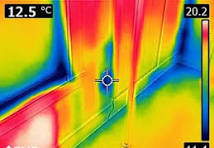Understanding Thermal Scans for New Build Homes: A Comprehensive Guide
In the realm of modern home construction, the pursuit of energy efficiency and comfort has become paramount. One of the key tools in achieving these goals is the thermal scan. But what exactly is a thermal scan for a new build home, and why is it essential? In this comprehensive guide, we’ll delve into the basics of thermal scans.
What is a Thermal Scans?
A thermal scan, also known as a thermographic inspection or infrared imaging, is a diagnostic technique used to detect and visualize thermal energy (heat) emitted by objects. In the context of new build homes, thermal scans are conducted to identify areas of heat loss, air leakage, insulation deficiencies, and other potential issues that may compromise energy efficiency and indoor comfort.

How Does it Work?
Thermal scans utilize infrared cameras to capture images that depict variations in surface temperatures. Warmer areas appear as lighter colors, while cooler areas appear darker. During a thermal scan of a new build home, trained professionals systematically scan the interior and exterior surfaces, including walls, ceilings, floors, windows, and doors.

By analyzing the thermal images, experts can pinpoint areas where heat is escaping or penetrating the building envelope. Common findings may include poorly insulated walls, gaps around windows and doors, thermal bridging, and moisture intrusion—all of which can contribute to energy inefficiency and discomfort within the home.

Why is it Important for New Build Homes?
Thermal scans play a crucial role in ensuring the energy efficiency and sustainability of new build homes. Here’s why they’re essential:
- Energy Efficiency: Identifying and addressing thermal deficiencies early on can significantly reduce energy consumption and utility costs over the lifetime of the home. By sealing air leaks, improving insulation, and optimizing HVAC systems based on scan findings, homeowners can enjoy lower energy bills while minimizing their environmental footprint.
- Comfort: A well-insulated and air-tight home maintains more consistent indoor temperatures, resulting in enhanced comfort for occupants. By eliminating drafts and cold spots, thermal scans contribute to a more pleasant living environment year-round.
- Durability: Thermal scans can uncover hidden moisture issues that, if left unaddressed, can lead to mold growth, rot, and structural damage over time. By identifying these issues early, builders can take corrective measures to ensure the long-term durability and integrity of the home.
- Building Code Compliance: Many building codes and energy efficiency standards require new homes to undergo thermal testing to ensure compliance. By conducting thermal scans during the construction process, builders can identify and rectify any deficiencies before the home is completed, avoiding costly retrofits or code violations down the line.
Case Study: The Smith Family’s New Home thermal scans findings
The Smith family recently moved into their newly constructed home. Excited about their energy-efficient investment, they decided to schedule a thermal scan to ensure everything was up to par. The scan revealed that their attic insulation was not installed properly, leading to significant heat loss. Thanks to the early detection, the issue was promptly addressed by the builder, saving the Smiths from potential discomfort and high energy bills in the long run.





book a new home inspection
If you’re building a new home or considering upgrades to your existing one, don’t overlook the importance of a thermal scan. It’s a proactive step towards maximizing energy efficiency, enhancing comfort, and ensuring the longevity of your home. Contact new homes inspection we are qualified professionals and can carry out a thermal inspection today and embark on the journey towards a greener, more comfortable living space.


Rattling superb information can be found on site.Blog monetyze